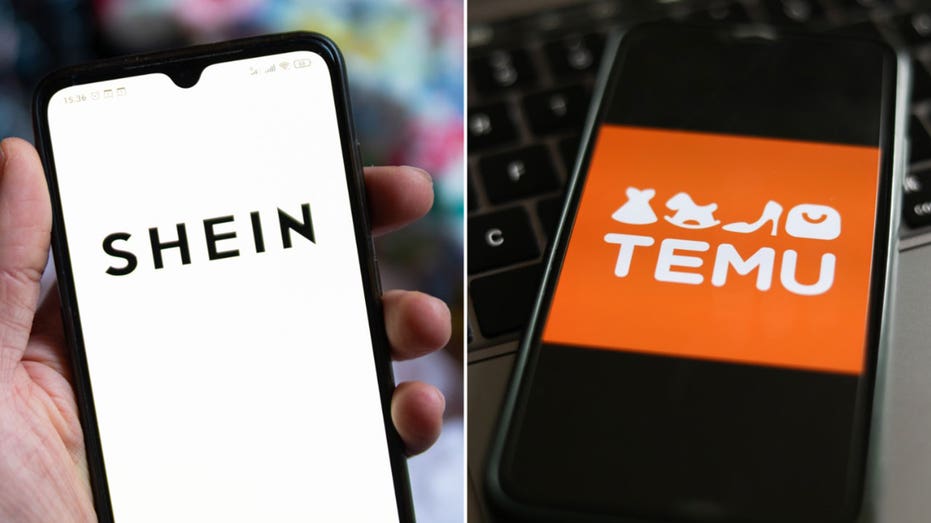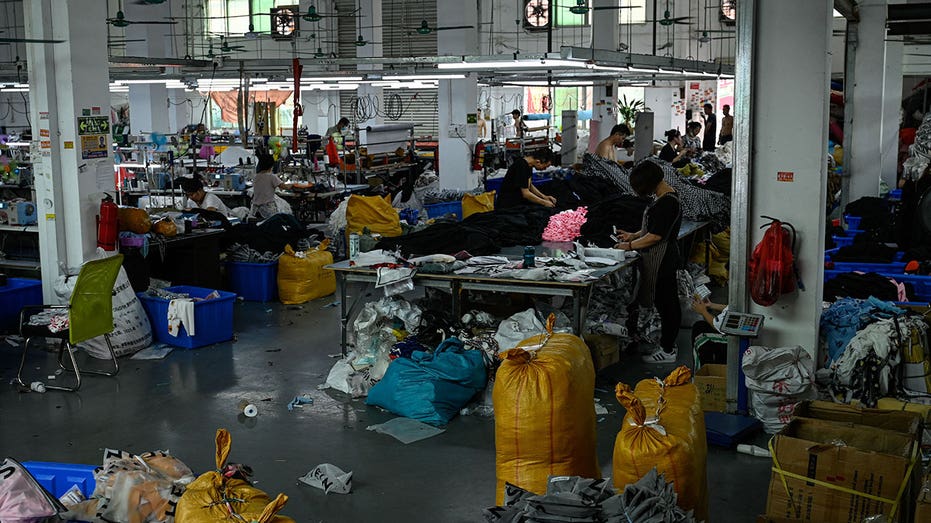House Committee releases 'shocking' findings in report on Chinese businesses operating in US
New report says Temu and Shein rely on de minimis exception to ship packages into the U.S.
The COVID breadcrumbs all point to the Wuhan Institute of Virology: Brad Wenstrup
Rep. Brad Wenstrup, R-Ohio, shares his takeaways from the first House subcommittee hearing on the origins of the COVID-19 pandemic on 'Kennedy.'
The House Select Committee on the Chinese Communist Party released a report Thursday indicating that Chinese e-commerce suppliers Temu and Shein are likely shipping products to the U.S. in violation of Uyghur forced labor laws.
The "Fast Fashion and Uyghur Genocide: Interim Findings" report determined that both Temu and Shein "rely heavily on the de minimis exception to ship packages directly to U.S. consumers," thus avoiding being screened for Uyghur Forced Labor Prevention Act (UFLPA) violations. Packages sent under this provision are provided admission free of duty if the retail value of the item does not exceed $800, according to the report.
The UFLPA directs the Forced Labor Enforcement Task Force to "develop a strategy for supporting enforcement of the prohibition on the importation of goods into the United States" that are partly or wholly manufactured via Chinese forced labor. These same packages also allow Temu and Shein to provide "less robust data" to Customs and Border Protection (CBP) as well as avoid import duties.
Fox News Digital reached out to Temu comment but did not immediately hear back.
U.S. TRACKED HUAWEI, ZTE WORKERS AT SUSPECTED CHINESE SPY SITES IN CUBA

House Select Committee on the Chinese Communist Party released a "shocking" report Thursday with new interim findings determining that Chinese e-commerce suppliers Temu and Shein may be shipping products to the U.S. in violation of forced labor laws. (Davide Bonaldo/SOPA Images/LightRocket via Getty Images // Jakub Porzycki/NurPhoto / Fox News)
"These results are shocking: Temu is doing next to nothing to keep its supply chains free from slave labor," Chairman Rep. Mike Gallagher, R-Wis., told Fox News Digital. "At the same time, Temu and Shein are building empires around the de minimis loophole in our import rules—dodging import taxes and evading scrutiny on the millions of goods they sell to Americans. We need to take a hard look at this loophole that is being abused to tilt the playing field against American companies."
The report included four main findings, including approximately how many likely packages shipped to the U.S. entered under the de minimis provision as well as the use of such exception to avoid UFLPA compliance.
Both Temu and Shein were found to be "likely responsible for more than 30% of all packages shipped to the United States daily under the de minimis provision," with possibly about half of all said shipments to the U.S. coming from China.
CHINA ‘PREPPING THE BATTLEFIELD’ AFTER MICROSOFT WARNS OF CYBER ATTACKS ON US INFRASTRUCTURE: EXPERT
The report also stated that Temu specifically does not currently have any system in place to ensure compliance with the UFLPA, with its business model, relying almost entirely on the de minimis provision. As such, Temu is allegedly avoiding compliance responsibility with the UFLPA and other forced labor prohibitions "while relying on tens of thousands of Chinese suppliers to ship goods direct to U.S. consumers."

"These results are shocking," Chairman Rep. Mike Gallagher, R-Wis., told Fox News Digital. (Andrew Harrer/Bloomberg via Getty Images / Getty Images)
"Simply put, Temu denies responsibility for ensuring that its 80,000, mostly China-based sellers do not sell products produced with forced labor because Temu is ‘not the importer of record with respect to goods shipped to the United States,’" the report states.
Temu was also found not to conduct any compliance audits or reports ensuring that its business practices act in accordance with the UFLPA.
CHINA SLAPS RESTRICTIONS ON US COMPANY OVER 'NATIONAL SECURITY' RISKS AS CHIP WAR ESCALATES
"The only measure Temu reported that it takes to ensure that it is not shipping goods to Americans that are produced with forced labor in violation of U.S. law was that its suppliers agree to boilerplate terms and conditions that prohibit the use of forced labor," the report read.

Workers make clothes at a garment factory that supplies SHEIN, a cross-border fast fashion e-commerce company in Guangzhou, in Chinas southern Guangdong province on July 18, 2022. (JADE GAO/AFP via Getty Images / Getty Images)
The report continued on to state that Temu "admitted" the company "does not expressly prohibit third-party sellers from selling products based on their origin in the Xinjiang Autonomous Region" in response to the committee's inquiry. The committee said this admission was "particularly concerning in light of Temu's lack of UFLPA compliance mechanisms."
The Committee's investigation is currently ongoing.
"SHEIN has provided detailed information to the Select Committee and will continue to engage transparently with Members to answer their questions," a Shein spokesperson told Fox News Digital. "We have zero tolerance for forced labor and have implemented a robust system to support UFLPA compliance, which includes a code of conduct, independent audits, robust tracing technology and third-party testing. We have no contract manufacturers in the Xinjiang region. If any cotton from an unapproved region is detected, we take immediate action such as suspending production, halting shipments to the United States and removing product listings."
"As a global company, our policy is to comply with the customs and import laws of the countries in which we operate. SHEIN continues to make import compliance a priority, including the reporting requirements under U.S. law with respect to de minimis entries," the spokesperson said.
GET FOX BUSINESS ON THE GO BY CLICKING HERE
A group of lawmakers back in April also called attention to products made with forced labor by Uyghurs in China possibly slipping into the U.S. under the de minimis provision. Leaders of the Congressional-Executive Commission on China wrote to the CBP seeking an explanation of how the provision for shipments applies under the UFLPA, saying at the time that they were considering legislation to address the loophole.
Fox News' Eric Revell contributed to this report.
